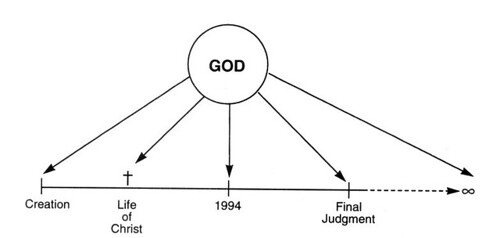Time has no effect on God’s knowledge. He never learns new things or forgets things - He always knows perfectly, i.e., He knows past, present, and future equally vividly.

God Is timeless is seen in Psalm 90:2: “Before the mountains were brought forth, or ever you had formed the earth and the world, from everlasting to everlasting you are God.” Similarly, in Job 36:26, Elihu says of God, “the number of his years is unsearchable.” He always exists. “I am the Alpha and the Omega,” says the Lord God, who is and who was and who is to come, the Almighty” (Rev. 1:8; cf. 4:8).
God’s own being does not have a succession of moments or any progress from one state of existence to another. To God himself, all of his existence is always somehow “present".
For I am God, and there is no other;
I am God, and there is none like me
declaring the end from the beginning
and from ancient times things not yet done
saying, “My counsel shall stand,
and I will accomplish all my purpose. (Isa. 46:9–10)
God somehow stands above time and is able to see it all as present in his consciousness.
Even so, God sees events in time and acts in time. Paul writes, “when the time had fully come, God sent forth his Son born of woman, born under the law, to redeem those who were under the law” (Gal. 4:4–5). God observed clearly and knew exactly what was happening with events in his creation as they occurred over time. We might say that God watched the progress of time as various events occurred within his creation. Then at the right time, “when the time had fully come,” God sent forth his Son into the world.
It is evident throughout Scripture that God acts within time and acts differently at different points in time. For example, Paul tells the men of Athens, “The times of ignorance God overlooked, but now he commands all men everywhere to repent, because he has fixed a day on which he will judge the world in righteousness by a man whom he has appointed...” (Acts 17:30–31). This statement includes a description of a previous way in which God acted, God’s present way of acting, and a future activity that he will carry out, all in time.
Indeed, the repeated emphasis on God’s ability to predict the future in the Old Testament prophets requires us to realize that God predicts his actions at one point in time and then carries out his actions at a later point in time. And on a larger scale, the entire Bible from Genesis to Revelation is God’s own record of the way he has acted over time to bring redemption to his people.
We must therefore affirm both that God has no succession of moments in his own being and sees all history equally vividly, and that in his creation he sees the progress of events over time and acts differently at different points in time; in short, he is the Lord who created time and who rules over it and uses it for his own purposes. God can act in time because he is Lord of time.17 He uses it to display his glory. In fact, it is often God’s good pleasure to fulfill his promises and carry out his works of redemption over a period of time so that we might more readily see and appreciate his great wisdom, his patience, his faithfulness, his lordship over all events, and even his unchangeableness and eternity.

No comments:
Post a Comment